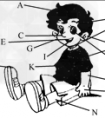单词填空。根据下列句子及所给汉语注释,写出各单词的正确形式,每空一词。 1. Many people came to the airport to wait for the famous actor's(到达).2. (平静下来) -八年级英语
主语+系动词+the+形容词最高级+of/in短语。
This story is the most interesting of the three.
1. one of the+形容词最高级+名词复数
它的意思是最…之一。
English is one of the most important languages in the world.
2. which/who…+is+形容词最高级
“…最...”
Which is the heaviest,the horse,the sheep or the elephant?
3.最高级前可以用序数词
The Yellow River is the second longest river in China.
|
构成 |
原级 |
比较级 |
最高级 |
|
一般加er,est |
tall |
taller |
tallest |
|
以字母e结尾只 |
large |
larger |
largest |
|
以一个辅音字母结尾的 |
red |
redder |
reddest |
|
hot |
hotter |
hottest | |
|
thin |
thinner |
thinnest | |
|
|
easy |
easier |
easiest |
|
happy |
happier |
happiest | |
|
ugly |
uglier |
ugliest | |
|
early |
earlier |
earliest | |
|
其他双音节词和多 |
interesting |
more interesting |
most interesting |
考点名称:实义动词的单数第三人称形式
在一般现在时的肯定句中,当主语为非第三人称单数时,谓语动词用原形;
当主语为第三人称单数时,谓语动词用单数第三人称形式。- 实义动词的一般现在时的单数第三人称形式遵从“s,es, ies”六字母规则。如下表所示:
实意动词单数第三人称变化规律:规则 动词原形 第三人称
单数形式s 一般在词尾加s(读音规则:
清清浊浊元浊,
在清辅音后读清辅音/s/,
在浊辅音和元音后读/z/)stop
take
clean
play
growstops/s/
takes/s/
cleans/z/
plays/z/
grows/z/es 以,x,ch,sh,或o结尾的动词
加-es(读/iz/)pass
fix
wash
watch
dopasses
fixes
washes
watches
doesies 以辅音字母
加y结尾的动词,变y为ies(读/iz/)fly
carry
hurryflies
carries
hurries
注意:不规则变化的有have—has, be—is, go—goes, do—does 一般现在时,当主语是第三人称单数时,谓语动词要用第三人称单数形式
主语是第三人称单数有以下几种情况:(1) 不可数名词做主语:
Some water is in the glass(2) 单个的可数名词做主语:
The girl is Chinese. My watch is on the dresser.
(3) He ,she , it 等代词单个做主语:
He is in the tree. She likes her family very much.
(4) 单个的人名,地名或称呼作主语:
Mary is a doctor. Uncle Li speaks a little English.
Changchun is a beautiful city.(5) 指示代词this, that 等作主语:
This is a pear. That is an apple .(6) Everyone, everything ,something, nobody, nothing.等不定代词作主语时
Is everyone here today? Everything is ok .(7)单个数字作主语时:
”8” is a good number in China.
动词单数第三人称形式的一般现在时的句子的否定句、疑问句及特殊疑问句。 <?xml:namespace prefix = "o" ns = "urn:schemas-microsoft-com:office:office" />否定句:
在主语的后面实义动词前加doesn’t(注意实义动词应恢复原形。)主语(单三)+doesn’ + 动词原形+其他
Jim likes football变否定: Jim doesn’t like football
He has lunch at school. 变否定:He doesn’t have lunch at school.
一般疑问句及答语,在句子前面加助动词does. 实义动词恢复原形Does +主语(单三)+ 动词原形+其他
Does your father work ? Yes, he does. /No, he doesn’t
特殊疑问句:特殊疑问词+一般疑问句特殊疑问词+ does +主语(单三)
- 最新内容
- 相关内容
- 网友推荐
- 图文推荐
| [家长教育] 孩子为什么会和父母感情疏离? (2019-07-14) |
| [教师分享] 给远方姐姐的一封信 (2018-11-07) |
| [教师分享] 伸缩门 (2018-11-07) |
| [教师分享] 回家乡 (2018-11-07) |
| [教师分享] 是风味也是人间 (2018-11-07) |
| [教师分享] 一句格言的启示 (2018-11-07) |
| [教师分享] 无规矩不成方圆 (2018-11-07) |
| [教师分享] 第十届全国教育名家论坛有感(二) (2018-11-07) |
| [教师分享] 贪玩的小狗 (2018-11-07) |
| [教师分享] 未命名文章 (2018-11-07) |






